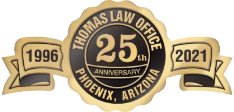
What Is Chapter 7 Bankruptcy In Arizona? | Award Winning Bankruptcy Lawyer
April 12, 2018
There are several types of bankruptcy. Chapter 7 bankruptcy is the most commonly-filed type of bankruptcy. The reason why it is so common is that it is much faster and easier than a Chapter 11 or 13 bankruptcy. Whereas a Chapter 13 or Chapter 11 bankruptcy can take years to complete; for example, a Chapter 13 bankruptcy must last at least three years but not more than five years; a Chapter 7 bankruptcy is typically over in a matter of months. In a Chapter 7 bankruptcy, you are permitted to keep property that is exempt. Exemptions vary from state to state. In Arizona, we have a set of exemptions that describe what a creditor cannot seize. If the creditor cannot seize it because of the exemptions, then the bankruptcy court typically cannot seize it, either.
Of course, there are exceptions. But the general principle to keep in mind is that in a Chapter 7 bankruptcy you can erase all the debt that is eligible to be erased, and you can keep all property that is exempt. But even if the property is exempt, you may lose it to a creditor who has a lien against that property, so it is important to obtain a consultation with an experienced Arizona bankruptcy attorney in order to make sure you will not be stepping into a landmine when you file your bankruptcy case. A Chapter 7 bankruptcy is usually much cheaper than a Chapter 13 or 11 bankruptcy, too. For example, most attorneys charge around $4,500 for Chapter 13 bankruptcy in Arizona.
But a Chapter 7 bankruptcy is often only a fraction of that amount, usually around $1,500, depending on the complexity of your situation. The more complex your case, the more it is going to cost. A Chapter 7 bankruptcy can provide lots of relief from creditors. It is a delight to see the smiles on clients’ faces when their bankruptcy case is over. It is as if a load of bricks has been lifted off their shoulders. There are some limitations on what a Chapter 7 bankruptcy can do. First of all, you will need to qualify for a Chapter 7 bankruptcy. There are several steps to qualifying. One step is whether your income to expense ratio is correct.
Basically, the expenses you will have even after your other debt is erased in bankruptcy; generally must exceed your after-tax income. Another important limitation is the inability to force auto and home (and other secured lenders) to let you catch up on your payments if you have fallen behind on your payments as of the date your Chapter 7 bankruptcy is filed. If you need time to bring your payments current, you’ll probably have to file a chapter 13 bankruptcy. Likewise, if your income exceeds your expenses, you’ll probably have to file a Chapter 7 bankruptcy. Chapter 7 bankruptcy has helped millions of Americans get a fresh start. It is one of the greatest financial tools to rid yourself of the massive debt many Americans find themselves in.
Who Is Eligible To File For A Chapter 7 Bankruptcy?
Either a person or a business can file for a Chapter 7 bankruptcy. If a business files for Chapter 7 bankruptcy, the business will essentially end. There is no such thing as filing a Chapter 7 for your business and then continuing to run the business after the bankruptcy is over. In fact, no discharge is even issued in business Chapter 7 cases. On the other hand, if you are a consumer, you can file for Chapter 7 bankruptcy if your income is not too high. If you are not trying to catch up mortgage or vehicle payments or catch up on other secured debt payments; if you have not filed a prior Chapter 7 (that resulted in discharge) within the past eight years; if you have resided in Arizona for at least 91 days prior to filing the case; if you are an individual or are filing together with a spouse; and if you don’t mind losing assets that can be seized by the bankruptcy trustee because no exemption applies.
There are other important factors that need to be closely analyzed in order to confirm eligibility for Chapter 7 bankruptcy. When you make an appointment at Thomas Law Office to meet with Mr. Thomas for a Chapter 7 bankruptcy, Mr. Thomas will carefully screen your case for the most common problems to make sure that Chapter 7 is right for you. Many of our bankruptcy consultations are free of charge, so it costs you nothing to come in and find out if you qualify and if so, whether there are any significant risks if you do file. There are situations where it pays to wait. By waiting, you may be able to keep more of your stuff. By waiting, you may time-bar claims that the bankruptcy trustee can make against you. Chapter 7 bankruptcy is a wonderful tool for shedding debt and getting a fresh start.
You can stop most garnishments, eliminate most debts, and surprisingly actually improve your credit score. Yes, that’s correct! Many of our clients who file for Chapter 7 bankruptcy end up with higher FICO scores a year or so after they file for Chapter 7 bankruptcy protection. Mr. Thomas “provides you with lots of useful information on how to rebuild your credit score even further. Some people are ashamed to file bankruptcy. They should not be ashamed to file for bankruptcy protection. Corporations file for bankruptcy protection to protect their interests; you should do the same.
Do not feel sad for the big banks and mega-lenders who would use every tool in the book to suppress you. These lenders have often received more than the principal amount you borrowed from them. They charge outrageous interest rates and should not have the benefit of your concern. They are cold, soulless entities who have no regard for the suffering of individuals and their families. You need to put yourself and your family ahead of the needs of these heartless corporations.
For more information on Chapter 7 Bankruptcy In Arizona, an initial consultation is your next best step. Get the information and legal answers you are seeking by calling today.








Serving Phoenix, Scottsdale, Mesa, Tempe, Paradise Valley, Glendale, Peoria, Surprise, and the Greater Phoenix, Arizona Metropolitan Area
